Actually, I was sure: Friedrich Schiller was born in the middle of the 18th century in the Württemberg town of Marbach; the wine with the same name, on the other hand, comes from Chur, the capital of the mountain canton Graubünden. I know this for a fact. I know the poet because I had to struggle with his "Glocke" at school: don't play "Old Shatterhand", learn it by heart: " und drinnen walten die züchtige Hausfrau, die Mutter der Kinder - und herrschet weise, im häuslichen Kreise - und lehret die Mädchen und wehret den Knaben." This has remained with me to this day, back then it was a nightmare.
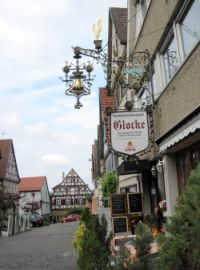 |
| Marbach - Birthplace of Friedrich Schiller |
Decades later, I was much better friends with the "Schiller from Chur", a very special wine made from grapes that I harvested year after year in the "Waisenhaus-Wingert" or the "Lochert" in Chur.
Schiller, the wine, is not only available in Chur, but also where Schiller, the poet, was born. In Württemberg. In the forum at Wein-Plus, I was told some time ago that the exclusivity of Chur was a mistake. Württemberg also claimed the right to cultivate Schiller wine as a speciality, not just Trollinger. Schiller, a rosé-coloured wine, is made from a mixture of white and red grapes, which are blended before the mash and which are harvested from the same plot (vineyard).
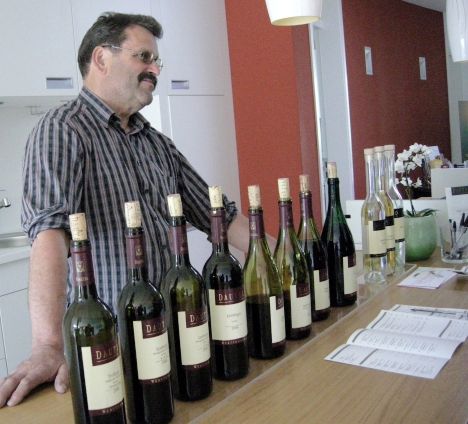 |
| Ernst Dautel presents his collection |
When two well-known winegrowers in Bönnigheim and Fellbach in Württemberg recently let me taste their "Württemberg speciality" called Schiller, I had to give in. Schiller also exists in Württemberg, not only the poet, but also the wine. Chur in Switzerland doesn't stand a chance. Its only worldwide exclusive is the white Completer, made from the oldest grape variety in Graubünden, also called "Malanser". Actually, it doesn't come from Chur either, but from Malans, a municipality about 17 kilometres down the Rhine. The grape of the Completer was first mentioned in a document in Malans in 926. It is still grown there today and made into a special white wine, a slightly nutty sweet wine reminiscent of quince and orange blossom and with a very special, even peculiar acidity. Like (almost) everything exclusive, this autochthonous vine is now also cultivated in the cantons of Zurich and Ticino, but in total not much more than 2 hectares in the whole of Switzerland, of which about 1.7 in the canton Graubünden.
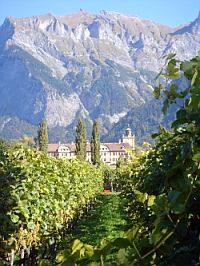 |
| Orphanage vineyard in Chur |
Chur, on the other hand, which is still the seat of a bishop, can lay claim to the name of wine. If tradition is correct, the canons of the Chur monastery are said to have enjoyed this noble wine after evening prayers, the Completorium. This is how it came to be called Completer.
But the name "Schiller" - for a wine - is not so exclusive. The obvious connection to the poet Friedrich Schiller in the wine region of Württemberg is not proven and unlikely. The name is much more likely to be derived - as I was taught - from the Old High German word schihlen, which means both "to squint" and "to shimmer in several colours". Any illusion was thus taken from me. "The purple wine pearls well in the glass, the eyes of the guests shine well, the singer shows himself, he enters, to the good he brings the best, for without the lyre in the heavenly hall, joy is mean even at the nectar banquet."
 |
| Schiller on the Schillerhöhe in Marbach |
What I would have liked to have attributed to Friedrich Schiller, the author of these verses, is simply an iridescent salmon red wine, which has another relative in Austria in "Schilcher". "Schiller" is a "Rotling" (how prosaic!), which is not only produced in Switzerland and Württemberg, but now also in Baden, Saxony and I don't know where else.
From an oenological point of view, this is probably quite correct, but for my wine dreams it is just as sobering: numbers, regulations, requirements, definitions accompany every wine, including the "Schiller". According to the Swiss wine ordinance, it must "consist of blue and white grapes of the AOC class, which come from the same parcel and are processed together". A wine house sums it up far more poetically in its advertising; "Planted together - grown together - matured together - harvested together - pressed together - fermented together - drunk together, then it is the real Schiller wine".
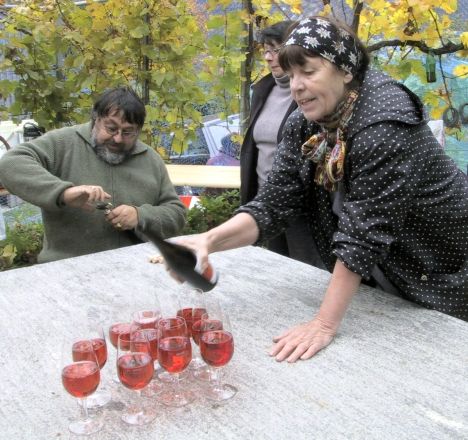 |
| Grape harvest at the "Lochertgut" - the winegrower serves "Schiller"% which is harvested here. |
This rather fires my imagination. Two bottles are on the table. It's summery warm, I've just tended my garden, sweating, physically tired, and I'm dreaming of a fresh, fruity drop. My choice: two Schiller wines, one from Chur, the other from Württemberg. Both are what is commonly called "drinkable", slightly astringent, with a nice berry nose. The German is berryier than the Swiss: quince, raspberries, strawberries. But also much, much sweeter. The lack of acidity makes it "lampy", also somewhat arbitrary. But the fine fragrance of my garden seems to have entered the volatile aromas of the wine. The Swiss is more powerful, more muscular, 14 percent alcohol volume, warm on the finish, but juicier compared to rosés, with an intense elderberry jelly aroma, clearly less residual sweetness than the Württemberger. It can also hold its own on the palate, stands far above the aromatics of a light red, especially because it retains its independence.
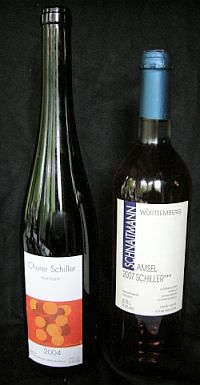 |
| Two Schiller. Left from Chur% Right from Württemberg |
All at once, the name loses its significance and stuff about origin becomes unimportant. The "Schiller" in the glass can also be a prince, a wine prince, proud, generous, neither opulent nor austere, but devoted to pleasure. My wine friends turn up their noses: just a rosé, we don't need that! It should be white or red, not reddish. The reputation of the little prince is fading, his empire is small, narrow, insignificant in the wine world. But I hear its pure-sounding, flattering tones, messages of nature. Not bloated like some reds, not polished like many whites. Actually a product of chance, from a time when red and white grapes were often grown together in the vineyard and pressed together. Princes are not yet kings or emperors. But they are much closer to their people.
Sincerely
Yours sincerely
Peter (Züllig)